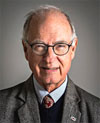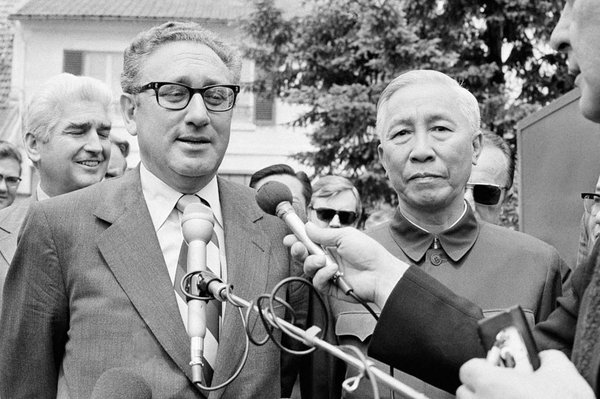Special to WorldTribune.com
 By Donald Kirk
By Donald Kirk
What is this disturbing nonsense we sometimes hear about a “Vietnam model” for permanent peace on the Korean peninsula?
Whoever’s talking about that either has to be joking or is totally unaware of the tragedy that befell South Vietnam after the signing of the “Paris peace accords” that were supposed to end the Vietnam War in January 1973.
These phony accords, negotiated by Henry Kissinger and North Vietnam’s Le Duc Tho, provided the cover for total withdrawal of American forces, the refusal by the U.S. Congress to provide more aid for the South Vietnamese, and the North Vietnamese takeover of the entire country in 1975.

If the Paris accords provide any lesson, or warning, it is that a false peace will lead not only to defeat but to the stark tragedy of tens of thousands getting killed or taken to brutal “reeducation” camps. Millions more would flee, fearful of repression by a cruel regime that would exterminate its enemies while imposing dictatorship over the entire country. Hopefully, neither American nor South Korean leaders are unaware of the sad history before considering any deal with Kim Jong-Un that would lead to the death and destruction of much of what people in the South have been building ever since the signing of the highly effective armistice that ended the Korean War in 1953.
Incredibly, Kissinger and Le Duc Tho were both awarded Nobel peace prizes for their peace agreement, but Le Duc Tho did not accept the accolade and Kissinger did not go to Oslo to make the traditional Nobel peace prize speech. They both knew the war was far from over and that North Vietnam would go on fighting, taking advantage of the enormous concessions that it had won in protracted negotiations that could only lead to the ultimate defeat of the South Vietnamese and the Americans who had fought for them. Kissinger, of course, has offered no apologies, shown no guilt. Rather, he blames Le Duc Tho and the North Vietnamese for going back on the agreement, as the South Vietnamese were well aware would happen.
One hears with disbelief that anyone in a responsible position in South Korea could honestly think that the accords that were to have ended the Vietnam War were anything but a sham, a pretext for going on with the fighting. All that the Americans wanted from the Paris peace was the release of several hundred pilots whose planes had been shot down in bombing attacks over the North. Most of them had been viciously abused. One notable example was John McCain, who spent six years as a POW undergoing torture and interrogation after having been severely injured parachuting from his plane. McCain, now in the final stages of brain cancer, wound up running for president in 2008 and has served six terms as a U.S. senator. Although he has visited Hanoi in recent years, he has no illusions about the horrors that would be inflicted on South Korea if anything like those Paris peace accords were copied as an “end” to the Korean War.
In fact, the kind of peace that is contemplated between North and South Korea might well be the prelude to a spectacle similar to that suffered by the Vietnamese. Think of the many millions who might take to the seas, as did two million South Vietnamese, embarking on dangerous journeys to new homes in distant lands. Think of the prisons to which captured South Vietnamese officers were consigned, often to be tortured and killed. Think of the dictatorship that prevails to this day, repressing free speech, jailing dissidents, while a small in-group of party and military leaders thrive on bribes and influence-peddling.
But yes, it can be argued that Vietnam, united under Communist rule exerted from Hanoi, is still far better off than when the country was divided between North and South. Visitors, including myself in recent years, do enjoy returning to Saigon and other cities. My favorite is the ancient imperial capital of Hue, where I touched down before, during and after the 1968 Tet offensive in which thousands of people were slaughtered by rampaging Viet Cong forces. Many more, including U.S marines, died in the month-long battle to retake the city, dominated by an expansive walled citadel.
South Korea does not have to go through a terrible war to reach a plateau of peace and calm. Seoul is a thriving world capital. The South’s economy is one of the world’s biggest, most productive and successful. There is no reason for South Korea to succumb to intimidation by the North. South Korean leaders of whatever political persuasion need to stand up to a blatant attempt by Kim Jong-Un and his inner circle of advisers to bully and trick them into a peace that would compromise and undermine the advanced level of civilization so carefully built and cultivated in the South since the dark days of the Korean War and its aftermath.
The same need for firmness and faith applies to the South’s American ally. The U.S. cannot desert South Korea as it did South Vietnam. President Trump should not fall for Kim’s transparently false promises. If there is one great lesson from the Paris peace of 1973, it is, Never Again betray a friend and ally just to sign a peace that is not worth the paper it’s printed on.
